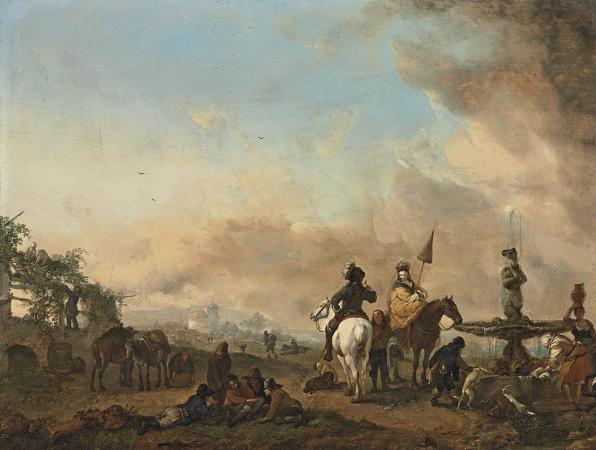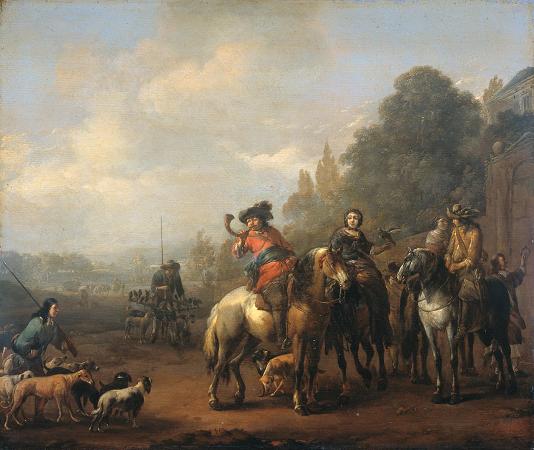Hunting Landscape. Hunting is a practice in which a certain type of animal is killed in a certain way: the animal must be wild, it must be able to flee, the killing requires violence, and that violence must be premeditated. The violence must also be at the hunter's initiative. Hunting wildlife or feral animals is most commonly done by humans for food, recreation, to remove predators that can be dangerous to humans or domestic animals, or for trade. Lawful hunting is distinguished from poaching, which is the illegal killing, trapping or capture of the hunted species. The species that are hunted are referred to as game or prey and are usually mammals and birds. Hunting arose in Homo erectus or earlier, on the order of millions of years ago. Hunting is deeply embedded in human culture. Hunting an animal for its meat can also be seen as a more natural way to obtain animal protein since regulated hunting does not cause the same environmental issues as raising domestic animals for meat, especially on factory farms. Hunting can also be a means of pest control. Hunting advocates state that hunting can be a necessary component of modern wildlife management, for example, to help maintain a population of healthy animals within an environment's ecological carrying capacity when natural checks such as predators are absent or very rare. However, the usefulness of hunting as a control measure has been questioned, and excessive hunting has also heavily contributed to the endangerment, extirpation and extinction of many animals. The pursuit, capture and release, or capture for food of fish is called fishing, which is not commonly categorised as a form of hunting. It is also not considered hunting to pursue animals without intent to kill them, as in wildlife photography, birdwatching, or scientific research activities which involve tranquilizing or tagging of animals or birds. The practice of foraging or gathering materials from plants and mushrooms is also considered separate from hunting. Skillful tracking and acquisition of an elusive target has caused the word hunt to be used in the vernacular as a metaphor, as in treasure hunting, bargain hunting, and even hunting down corruption and waste. Some animal rights activists argue that hunting is cruel, unnecessary, and unethical. The word hunt serves as both a noun and a verb. The noun has been dated to the early 12th century, act of chasing game, from the verb hunt. The meaning of a body of persons associated for the purpose of hunting with a pack of hounds is first recorded in the 1570s. Meaning the act of searching for someone or something is from about 1600. The verb, Old English huntian to chase game, perhaps developed from hunta hunter, is related to hentan to seize, from Proto-Germanic huntojan, which is of uncertain origin. The general sense of search diligently is first recorded c. 1200. Further information: Hunting hypothesis and Endurance running hypothesis Hunting has a long history. It pre-dates the emergence of Homo sapiens and may even predate genus Homo. The oldest undisputed evidence for hunting dates to the Early Pleistocene, consistent with the emergence and early dispersal of Homo erectus, about 1.7 million years ago.While it is undisputed that Homo erectus were hunters, the importance of this for the emergence of Homo erectus from its australopithecine ancestors, including the production of stone tools and eventually the control of fire, is emphasised in the so-called hunting hypothesis and de-emphasised in scenarios that stress omnivory and social interaction. There is no direct evidence for hunting predating Homo erectus, in either Homo habilis or in Australopithecus.The early hominid ancestors of humans were probably frugivores or omnivores, with a partially carnivore diet from scavenging rather than hunting.Evidence for australopithecine meat consumption was presented in the 1990s.It has nevertheless often been assumed that at least occasional hunting behavior may have been present well before the emergence of Homo.This can be argued on the basis of comparison with chimpanzees, the closest extant relatives of humans, who also engage in hunting, indicating that the behavioral trait may have been present in the Chimpanzee-human last common ancestor as early as 5 million years ago.
more...














